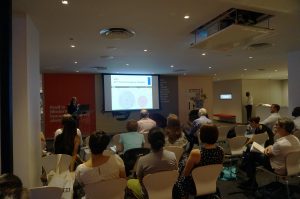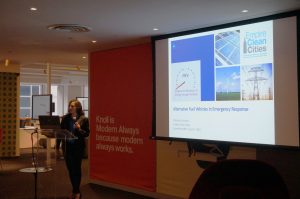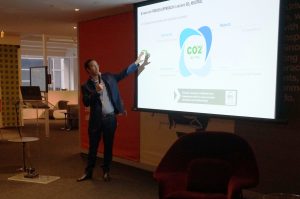by Ryan Hughes
Opportunities for organizations to improve their environmental and competitive advantage by reducing their climate

impact are prevalent, yet not always apparent. The GreenHomeNYC July Forum on Government and Corporate Commitments drew a diverse crowd of industry professionals, students, teachers, job seekers, city officials and the public to discuss the multitude of challenges and growing successes in corporate and governmental sustainability. From methods of integrating alternative fuels in emergency response vehicles, to rethinking and automating our transportation system, to using sustainable economic methods to rethink the way we plan for company growth, the Forum offered a front row seat for the systemic changes remapping industry and our world.
Offering their professional insights were
Christina Ficicchia, Executive Director of Empire Clean Cities (ECC),
Mariana Torres-Montoya, Principal Economist at The Louis Berger Group, and
Hervé Billiet, Managing Partner at CO2logic Inc.
 Resiliency Through Alternative Fuels
Resiliency Through Alternative Fuels
“Emergency scenarios like Superstorm Sandy only highlight the desperate need for change,” said Christina Ficicchia, Executive Director of
Empire Clean Cities. The non-profit organization works to reduce the use of petroleum in transportation throughout New York City and the Lower Hudson Valley, in order to advance the economic, environmental, and energy security of the region. To achieve its mission, ECC works to build public-private partnerships with vehicle fleets, fuel providers, community leaders, and other stakeholders.
Ficicchia also acts as the US Department of Energy Clean Cities Coalition Coordinator for the region. She develops strategies and programs that fulfill the ECC mission and promote the acceptance of alternative fuel fleet vehicles, particularly for disaster/emergency response vehicles.
One of these programs is the Initiative for Resiliency in Energy through Vehicles (iREV). The project aims to bolster emergency management and response by using existing alternative fuel fleet vehicles for emergency situations. iREV offers tools and coordination strategies to incorporate alternative fuels into emergency operations, thereby reducing our dependence on foreign oil, increasing energy efficiency, and lessening vulnerability during emergencies by diversifying our energy supply.
Transportation Revolution
Mariana Torres-Montoya, Principal Economist at
The Louis Berger Group, described the emergent world of automated cities, where form and function meet harmoniously to accelerate people and goods. She emphasized city planning and cooperation among stakeholders as paramount in achieving the “transportation revolution”. This revolution seeks to eliminate inefficiencies in traffic flow, parking, and time management by connecting passengers to driverless vehicles, automating delivery modes and services, and streamlining and integrating public and private transportation authorities – all while reducing carbon emissions and city sprawl.
Acknowledging the inherent difficulties in completely re-imagining the transportation system, Torres-Montoya cited questions and fears over ownership and the dangers of operating a “mixed fleet” during the interim period. “Ultimate success of the transportation revolution depends on eventually achieving full automation. We are in the danger zone until then,” she said.
Credible Climate Action
Hervé Billiet rounded out the evening by illuminating the role corporations play in environmental impact. His firm,
CO2logic, enables corporations, organizations and cities to become carbon neutral by calculating, reducing and offsetting CO2 emissions.
“The need is real,” he said. “65% of our carbon budget compatible with a 2℃ target is already used up. We have 20 years of emissions with 2℃ target, only 10 years with 1.5℃ target.” 99% of climate scientists believe even a 2℃ target will endanger civilization.
But don’t lose hope! Billiet described his four-step proven approach to help organizations become carbon neutral – CROC, which stands for Calculate, Reduce, Offset, Communicate.

The first step is to assess and
calculate an organization’s current carbon footprint. The next step is to identify opportunities for carbon
reduction and implement them. Any incompressible carbon footprint that remains after these CO2 reduction efforts can be
offset by financially supporting a CO2 reduction project in a developing country. Finally, the new strategies are
communicated to internal and external stakeholders.
Billiet’s firm has already helped companies like Duvel (Belgian beer), Dolfin (Belgian chocolate), and Le Pain Quotidien (global restaurant chain) to offset and reduce their carbon impact. He emphasized examining the entire lifecycle of products, from cradle to grave, to find and root out inefficiencies. “When companies eliminate inefficiencies and promote sustainability, they not only help to reduce carbon dioxide in the atmosphere – they also improve their competitive edge,” he added.
Aiming for Sustainable Systems
The complexity of changing the status quo within a company or government should not be underestimated, yet we are at a point where we can’t afford
not to aim for more sustainable operations. The speakers reminded the audience that change is a group effort and leadership is key to making the changes we need to burn cleaner fuel, improve transportation and increase efficiency within manufacturing.
Photo credits: Emily Taubenblatt
 impact are prevalent, yet not always apparent. The GreenHomeNYC July Forum on Government and Corporate Commitments drew a diverse crowd of industry professionals, students, teachers, job seekers, city officials and the public to discuss the multitude of challenges and growing successes in corporate and governmental sustainability. From methods of integrating alternative fuels in emergency response vehicles, to rethinking and automating our transportation system, to using sustainable economic methods to rethink the way we plan for company growth, the Forum offered a front row seat for the systemic changes remapping industry and our world.
Offering their professional insights were Christina Ficicchia, Executive Director of Empire Clean Cities (ECC), Mariana Torres-Montoya, Principal Economist at The Louis Berger Group, and Hervé Billiet, Managing Partner at CO2logic Inc.
impact are prevalent, yet not always apparent. The GreenHomeNYC July Forum on Government and Corporate Commitments drew a diverse crowd of industry professionals, students, teachers, job seekers, city officials and the public to discuss the multitude of challenges and growing successes in corporate and governmental sustainability. From methods of integrating alternative fuels in emergency response vehicles, to rethinking and automating our transportation system, to using sustainable economic methods to rethink the way we plan for company growth, the Forum offered a front row seat for the systemic changes remapping industry and our world.
Offering their professional insights were Christina Ficicchia, Executive Director of Empire Clean Cities (ECC), Mariana Torres-Montoya, Principal Economist at The Louis Berger Group, and Hervé Billiet, Managing Partner at CO2logic Inc.
 Resiliency Through Alternative Fuels
“Emergency scenarios like Superstorm Sandy only highlight the desperate need for change,” said Christina Ficicchia, Executive Director of Empire Clean Cities. The non-profit organization works to reduce the use of petroleum in transportation throughout New York City and the Lower Hudson Valley, in order to advance the economic, environmental, and energy security of the region. To achieve its mission, ECC works to build public-private partnerships with vehicle fleets, fuel providers, community leaders, and other stakeholders.
Ficicchia also acts as the US Department of Energy Clean Cities Coalition Coordinator for the region. She develops strategies and programs that fulfill the ECC mission and promote the acceptance of alternative fuel fleet vehicles, particularly for disaster/emergency response vehicles.
One of these programs is the Initiative for Resiliency in Energy through Vehicles (iREV). The project aims to bolster emergency management and response by using existing alternative fuel fleet vehicles for emergency situations. iREV offers tools and coordination strategies to incorporate alternative fuels into emergency operations, thereby reducing our dependence on foreign oil, increasing energy efficiency, and lessening vulnerability during emergencies by diversifying our energy supply.
Transportation Revolution
Resiliency Through Alternative Fuels
“Emergency scenarios like Superstorm Sandy only highlight the desperate need for change,” said Christina Ficicchia, Executive Director of Empire Clean Cities. The non-profit organization works to reduce the use of petroleum in transportation throughout New York City and the Lower Hudson Valley, in order to advance the economic, environmental, and energy security of the region. To achieve its mission, ECC works to build public-private partnerships with vehicle fleets, fuel providers, community leaders, and other stakeholders.
Ficicchia also acts as the US Department of Energy Clean Cities Coalition Coordinator for the region. She develops strategies and programs that fulfill the ECC mission and promote the acceptance of alternative fuel fleet vehicles, particularly for disaster/emergency response vehicles.
One of these programs is the Initiative for Resiliency in Energy through Vehicles (iREV). The project aims to bolster emergency management and response by using existing alternative fuel fleet vehicles for emergency situations. iREV offers tools and coordination strategies to incorporate alternative fuels into emergency operations, thereby reducing our dependence on foreign oil, increasing energy efficiency, and lessening vulnerability during emergencies by diversifying our energy supply.
Transportation Revolution Mariana Torres-Montoya, Principal Economist at The Louis Berger Group, described the emergent world of automated cities, where form and function meet harmoniously to accelerate people and goods. She emphasized city planning and cooperation among stakeholders as paramount in achieving the “transportation revolution”. This revolution seeks to eliminate inefficiencies in traffic flow, parking, and time management by connecting passengers to driverless vehicles, automating delivery modes and services, and streamlining and integrating public and private transportation authorities – all while reducing carbon emissions and city sprawl.
Acknowledging the inherent difficulties in completely re-imagining the transportation system, Torres-Montoya cited questions and fears over ownership and the dangers of operating a “mixed fleet” during the interim period. “Ultimate success of the transportation revolution depends on eventually achieving full automation. We are in the danger zone until then,” she said.
Credible Climate Action
Hervé Billiet rounded out the evening by illuminating the role corporations play in environmental impact. His firm, CO2logic, enables corporations, organizations and cities to become carbon neutral by calculating, reducing and offsetting CO2 emissions.
“The need is real,” he said. “65% of our carbon budget compatible with a 2℃ target is already used up. We have 20 years of emissions with 2℃ target, only 10 years with 1.5℃ target.” 99% of climate scientists believe even a 2℃ target will endanger civilization.
But don’t lose hope! Billiet described his four-step proven approach to help organizations become carbon neutral – CROC, which stands for Calculate, Reduce, Offset, Communicate.
Mariana Torres-Montoya, Principal Economist at The Louis Berger Group, described the emergent world of automated cities, where form and function meet harmoniously to accelerate people and goods. She emphasized city planning and cooperation among stakeholders as paramount in achieving the “transportation revolution”. This revolution seeks to eliminate inefficiencies in traffic flow, parking, and time management by connecting passengers to driverless vehicles, automating delivery modes and services, and streamlining and integrating public and private transportation authorities – all while reducing carbon emissions and city sprawl.
Acknowledging the inherent difficulties in completely re-imagining the transportation system, Torres-Montoya cited questions and fears over ownership and the dangers of operating a “mixed fleet” during the interim period. “Ultimate success of the transportation revolution depends on eventually achieving full automation. We are in the danger zone until then,” she said.
Credible Climate Action
Hervé Billiet rounded out the evening by illuminating the role corporations play in environmental impact. His firm, CO2logic, enables corporations, organizations and cities to become carbon neutral by calculating, reducing and offsetting CO2 emissions.
“The need is real,” he said. “65% of our carbon budget compatible with a 2℃ target is already used up. We have 20 years of emissions with 2℃ target, only 10 years with 1.5℃ target.” 99% of climate scientists believe even a 2℃ target will endanger civilization.
But don’t lose hope! Billiet described his four-step proven approach to help organizations become carbon neutral – CROC, which stands for Calculate, Reduce, Offset, Communicate.
 The first step is to assess and calculate an organization’s current carbon footprint. The next step is to identify opportunities for carbon reduction and implement them. Any incompressible carbon footprint that remains after these CO2 reduction efforts can be offset by financially supporting a CO2 reduction project in a developing country. Finally, the new strategies are communicated to internal and external stakeholders.
Billiet’s firm has already helped companies like Duvel (Belgian beer), Dolfin (Belgian chocolate), and Le Pain Quotidien (global restaurant chain) to offset and reduce their carbon impact. He emphasized examining the entire lifecycle of products, from cradle to grave, to find and root out inefficiencies. “When companies eliminate inefficiencies and promote sustainability, they not only help to reduce carbon dioxide in the atmosphere – they also improve their competitive edge,” he added.
Aiming for Sustainable Systems
The complexity of changing the status quo within a company or government should not be underestimated, yet we are at a point where we can’t afford not to aim for more sustainable operations. The speakers reminded the audience that change is a group effort and leadership is key to making the changes we need to burn cleaner fuel, improve transportation and increase efficiency within manufacturing.
Photo credits: Emily Taubenblatt
The first step is to assess and calculate an organization’s current carbon footprint. The next step is to identify opportunities for carbon reduction and implement them. Any incompressible carbon footprint that remains after these CO2 reduction efforts can be offset by financially supporting a CO2 reduction project in a developing country. Finally, the new strategies are communicated to internal and external stakeholders.
Billiet’s firm has already helped companies like Duvel (Belgian beer), Dolfin (Belgian chocolate), and Le Pain Quotidien (global restaurant chain) to offset and reduce their carbon impact. He emphasized examining the entire lifecycle of products, from cradle to grave, to find and root out inefficiencies. “When companies eliminate inefficiencies and promote sustainability, they not only help to reduce carbon dioxide in the atmosphere – they also improve their competitive edge,” he added.
Aiming for Sustainable Systems
The complexity of changing the status quo within a company or government should not be underestimated, yet we are at a point where we can’t afford not to aim for more sustainable operations. The speakers reminded the audience that change is a group effort and leadership is key to making the changes we need to burn cleaner fuel, improve transportation and increase efficiency within manufacturing.
Photo credits: Emily Taubenblatt

Leave a Reply
You must be logged in to post a comment.